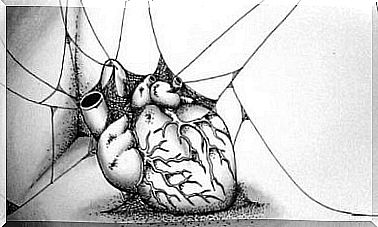Adults Also Have Tantrums – Why Does This Happen?

When you hear the word “rage attack”, you probably see a 2-3 year old child lying on the ground screaming. Adults also have tantrums. Sometimes they let emotions take over. This is especially true of emotions such as frustration, jealousy and disappointment.
According to behaviorism, the field of psychology that studies human behavior on stimuli and responses, tantrums are clearly maladaptive behavior. It happens mainly because they do not achieve anything.
The fact that they do not lead to anything concrete (or something that is really useful) does not mean that this behavior has no meaning behind it. On the contrary, these emotional outbursts deliver a message that is very meaningful.
When you are between two and four years old, tantrums are a common part of a child’s emotional development. They are nothing more than a challenge that every mother and father must learn to deal with calmly and effectively.
Sometimes you simply forget that growing up and not growing up does not automatically give you the ability and maturity to recognize and control your emotions.
So much so that we can say without a doubt that there are many adults in your life who are full of the emotional intelligence of a 3-year-old child. Most of the time, they did not have a good self-esteem during childhood.
Similarly, they probably did not have access to sufficient help to channel and understand their own emotional universe. Thus, it is common for them to spend several years carrying the same load.

Adults also have tantrums due to powerlessness
An outburst of rage, temper tantrums or emotional outbursts of anger consists of an excessive reaction to a frustrating situation. For example , children usually express anger by screaming, crying, kicking and a general loss of emotional control. There are different intensities.
However, what is always present is the disproportionate behavior and the deficit in communication. In the same way, there is a level of powerlessness when it comes to dealing with emotions and impulses.
In adults, on average, the rage does not result in physical aggression. There is no kicking, hitting or biting. In most cases, they can even go unnoticed by the people in their immediate surroundings.
Let’s take a look at an example. Trine works for a law firm and is used to success. Each time she reaches a goal, she is rewarded with a bonus. However, when her colleagues have achieved the same success, Trine does not tolerate it. She does not lie down on the floor or shout. She actually says nothing at all.
Trine holds it in until she goes to the toilet and cries in a booth. This is because she does not tolerate the success of her companions surpassing her own at any given time. In any case, jealousy eats her up from within, and she does not know how to deal with that discomfort.
Adults also have tantrums, but do not get confused. Just like children’s tantrums, these explosions, if they are real, do not try to manipulate anyone.

What causes some adults to have frequent tantrums?
Not everyone expresses their tantrums as privately as Trine does. It is just as common to find people who never hesitate to create a great drama during their tantrum. There is screaming and throwing objects on the ground. Worst of all is aggression, and there are also insults and disrespect. What is behind all this behavior?
We said that at the beginning. In most cases, tantrums are the demonstration of a clear emotional immaturity. They are the result of a lack of self-esteem where one is unable to deal with frustrations or disappointments. Like any good professional, we can not ignore other reasons to get an adequate diagnosis.
- Adults also have tantrums. Those who have them on a regular basis may have a personality disorder, bipolar disorder, obsessive-compulsive disorder, narcissistic personality disorder, etc.
- Post-traumatic stress disorder can also be the cause of this behavior.
- People with autism spectrum disorders may also have this behavior.
What can I do if I am an adult who also has tantrums?
Let’s think about Trine for a moment. Put yourself in her shoes and in the difficulty of asking for help. How can she tell someone that her feelings are completely out of control when her colleagues are recognized, but she is not? How can she say that she feels shame in addition to anger? She knows she should not feel that way, but she does not know how to deal with it.
When you are an adult, it is very difficult to talk about the jealousy and frustration that you feel in certain situations. However, nothing can be more positive than taking that step and asking for professional help. You will feel more skilled, safe and free on a daily basis.
Let us now reflect on a number of strategies that can help you in these cases. These are simple tips that can improve your capacity for self-control instead of feeding your behavior when these feelings arise.
Steps to better manage your emotional tantrums
Check your expectations
If adults also have tantrums, it is because they sometimes have an unrealistic view of certain situations. In particular, they expect certain recognitions, support, benefits or achievements that are unreasonable.
Do not trap negative emotions or let them erupt: Channel them in a constructive way
Every time you feel a kind of frustration, let it manifest itself in a different way. No screaming, no tears, no anger. Find a useful way to manifest it: talk to someone, play sports, paint, write, etc.
Identify the important situations that trigger your tantrums
For example, envy, not getting what you want at work or in your relationship are some of them.
You can work on these situations once you have identified them
Create an inner dialogue or action plan where you can act in an acceptable, mature and emotionally intelligent way when situations arise.

We can conclude that you now know that adults also have tantrums. Also, you may have had one yourself on a particular occasion. If there is one thing that you really remember from having them, it is that they are not entirely pleasant. They create discomfort, create very uncomfortable environments and you get nothing out of them.
It’s time to work on your emotions. Give yourself new outlets and resources that make you feel more competent.







